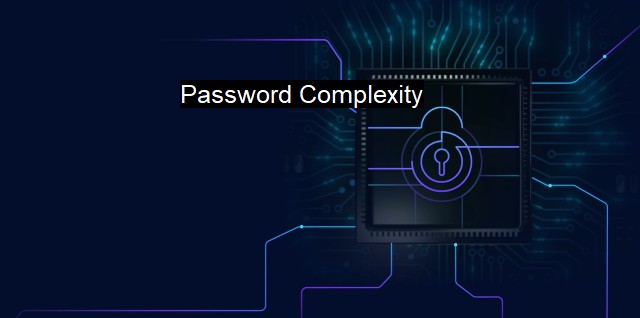What is Password Complexity?
The Crucial Role of Password Complexity in Safeguarding Organizations Against Complex Cybersecurity Threats
Password complexity, also known as password strength can be defined as a measurement primarily concerned with the difficulty an attacker would encounter in trying to guess a user's password. This complexity remains significant especially when an antivirus program identifies a threat, and the strength of the user's password assists in thwarting the likelihood of the threat compromising user data.Password complexity revolves around several elements. Mostly, it stipulates the integration of various characters, including letters (lowercase and uppercase), numbers, and symbols. What also factors into the complexity requirement is the password length, which should typically be eight or more characters. The idea behind mandating such intricacy is to make it nearly impossible for cyber attackers to guess the password either by manual or automated means, commonly known as brute force attacks.
To begin with, a password's composition and length are of prime importance when discussing password complexity. A recommended password often includes a mix of alphanumeric characters, case-sensitive letters and special characters. Each additional unit of complexity exponentially increases the set of possible combinations. For instance, an eight-character password utilizing only lowercase letters has approximately 209 billion potential combinations. an eight-character password using upper and lowercase letters, digits, and common symbols leaps to over six quadrillion possibilities.
Repeated characters, common dictionary words, user's personal information, or consecutive keyboard sequences, tend to diminish the password's complexity, making it easier for cybercriminals to decrypt. Password complexity, therefore, demands randomness to keep passwords secure. Instead of using birthdays, phone numbers, or pet's names, which are highly predictable, the users should aim for random, unrelated words interspersed with varied characters.
Another key aspect of password complexity as a security measure within the realm of antivirus services is ensuring the continuity of user protection against potential malicious software. If an antivirus identifies a threat trying to gain access to the user’s data, the complexity of the user’s password plays a crucial role in preventing a possible data hack in the event of a system compromise. The antivirus works like a shield against malware, and the password serves as another line of defense, safeguarding valuable personal or enterprise data in the case of potential security breaches.
While enforcing mandatory password complexity is crucial in raising the bar against brute force and dictionary attacks, it is also important to realize that it can lead to passwords that can be difficult to remember. For this cause, many organizations are heading towards the use of alternative methods like password managers or two-factor authentications. The balancing act between the complexity and usability of passwords is deemed as one of the major challenges with password creation.
Passphrases are rising in popularity as they could offer a helpful middle ground. Passphrases consist of a string of multiple words that could form a sentence or a phrase which is easier to remember, and yet difficult to crack due to its length. Since the length of the password plays a role as significant as its randomness, long passphrases can often provide more security when compared to short but complex passwords.
The importance of password complexity in protecting digital platforms from potential cyber threats cannot be overstated. As cyber attacks continue to innovate and evolve, so does the need for users to continuously create complex and secure passwords. Maintaining stringent password complexity practices, along with using antivirus software, would potentially grant the user with a formidable guard against formidable cybersecurity threats and place a major hurdle in the path of any attempted cyber infringement.

Password Complexity FAQs
What is password complexity, and why is it important in cybersecurity?
Password complexity refers to the degree of difficulty of a password, which determines its likelihood of being guessed or cracked. It is essential in cybersecurity because weak passwords can easily be exploited by hackers and malicious software, compromising your personal and business data.What are some characteristics of a strong password?
A strong password should have a minimum of eight characters, including a mix of uppercase and lowercase letters, numbers, and symbols. Avoid using common phrases or easily guessable personal information, such as birthdates or pet names.Do I need to change my password regularly to maintain its complexity?
Yes, changing your password frequently can help prevent brute-force attacks and reduce the risk of data breaches. It is recommended to change your password every 60-90 days or as often as your organization's security policy requires.Is password complexity the only way to secure my data against cyber threats?
No, password complexity is just one component of cybersecurity. It is essential to use other security measures, such as antivirus software, firewalls, and regular software updates, to protect your data from cyber threats. Additionally, implementing multi-factor authentication or biometric authentication can add an extra layer of security to your accounts.| | A | | | B | | | C | | | D | | | E | | | F | | | G | | | H | | | I | | | J | | | K | | | L | | | M | |
| | N | | | O | | | P | | | Q | | | R | | | S | | | T | | | U | | | V | | | W | | | X | | | Y | | | Z | |
| | 1 | | | 2 | | | 3 | | | 4 | | | 7 | | | 8 | | |||||||